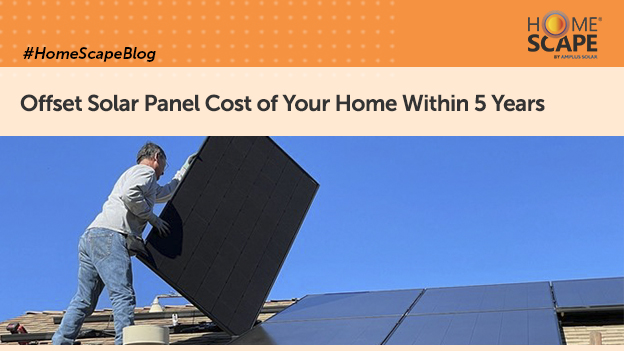High electricity bills among rising inflation have become the new normal for homeowners. Considering the current global energy crisis coupled with the ever-increasing energy demand in India, we cannot expect to come out of this situation in the near future.
Switching to renewable energy for homes can be the turn for the better. Although the rooftop solar price can be intimidating, in the long-term, your solar panel will pay for itself.
Generally, within 5 years of its installation, you can offset the cost of solar panels and start getting free electricity.
Why You Must Switch to Renewable Energy for Home
Solar power systems for homes are a cost-efficient energy alternative. Unlike your energy distributors that charge per unit of consumption, the sun believes in generosity. All renewable energy sources, including solar power, exist naturally and the only payment you need to make is for the installation of equipment that can harness their energy.
Investing in a solar power system for home can provide you with electric independence as you will always have enough energy to power your home without worrying about power outages or rising energy costs (with battery integrated solar and storage).
Most of us don’t know that valuable electric units are lost in transporting energy from big power plants via extensive networks to homes. As the electricity moves through power lines, a significant proportion is again lost due to resistance. Now imagine the extent of power losses when transmitting electricity over long distances!
Solar panel Installation along with battery storage means that the energy generated will immediately become domestic, putting you in control of your utility bills and ensuring efficient power usage.
When we look at the climate crisis and how solar power is a clean, green energy source, opting for residential solar systems becomes a responsible choice. The sun is a self-sufficient source of renewable energy and doesn’t leave any carbon footprints or cause any direct harm to the environment. The production of solar energy via solar panels doesn’t release toxic chemicals or greenhouse gases either. Solar energy is clearly the cost-effective pathway to a sustainable future.
Cost of Residential Solar Panels
Solar energy has come a long way from just being a commercial technology to a sensible home upgrade as the cost of rooftop solar panels for homes has been declining for the past decade. Regardless of the declining cost, the upfront investment required to purchase and install solar panels is still high for homeowners. A 5kw residential solar system, for instance, will cost in lakhs. Per watt cost and the type of system will determine the exact total for your home.
If you are still on the fence about investing a large amount into a residential solar system, there are warranties to offer you the confidence that you will see a greater return on your investment and significant savings. With material warranty and product warranty, you can rest assured that most of your total residential solar panel installation cost will return in the form of electricity produced.
Economic Return of Residential Solar Panels
One good news is that the long-term expenses for most solar systems are minimal to nil, which makes up for the initial cost of solar panels with battery storage. Modern photovoltaic solar panels are manufactured for high industry standards and can last for around 25 years, some even longer. Even after your panels are past their projected timespan, your solar system will continue to work for many decades.
When you weigh your solar system’s maintenance requirements and life expectancy against its upfront cost and your current electricity cost, you can expect it to pay off its cost in just 9-12 years of use. Post this period, you are simply saving your electricity bills as well as the environment by using solar power. Even if your system’s payback time is a little longer than the project time, it is still considered favorable.
The Internal Rate of Return (IRR) is a more important factor than the payback time. IRR is presented as the percentage of ROI (Return on Investment). IRR evaluates the rate of returns you can expect from your solar power installation, which is then used as a benchmark for other projects.
A “decent” IRR rate is the one that indicates that your solar power investment is giving you the same amount of return that you would have achieved had you made a profitable investment instead. The return you would have thus received would not only be enough to pay your electricity bill, but you would still be able to have savings after clearing the tax obligations on that investment.
The good news is that many homeowners have considerable potential to save with solar systems. And a high IRR rate can further cut short the payback period to 5 years.
Need help assessing your power needs and finding the right solar system for your home? Get in touch with HomeScape by Amplus Solar. Our rooftop solar panels for homes are designed with durability as the main focus. Designed by a team of engineers and designers, our pergola-style solar panels add to the value of your home. We offer easy purchase and financing options along with our lifelong customer service and specialized performance tracker.
Contact us to find out the cost of solar panels with battery storage and the cost of residential solar panel installation and also calculate your savings with our professionals.



